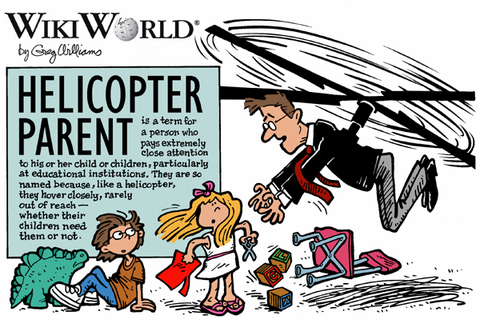Beiwel: Helicopter parenting hurts both sides

Columnist Beiwel believes that helicopter parenting can create problems such as depression and self-esteem issues in children.
October 23, 2015
Parents are in a uniquely privileged place to influence their children’s lives by choosing schools, dictating homework times and making sure their child is well prepared for the rigors of adult life. Most children, though initially resentful, will later admit they appreciate the extra pressure from a parent who cares. Having your parents in your corner is invaluable.
But what happens when that persuasiveness turns manic, encouragement becomes obsessive and parents stops being parents? They become helicopters: a buzz word in the parenting world.
Helicopter parenting is a relatively new form of parenting that is becoming more common as the years go by. Parents who fall under this category nitpick their children, encourage a large number of extra curricular activities and emphasize academic success above all else, opposed to just letting kids be kids while they have the chance to.
Growing up, my mom tried to push me academically. She wanted me to do better than her, so throughout school she always told me how I could be more successful.
In high school, academics weren’t the highest on my priority list but, bless her, with all her worry my mom never made me feel like I was less or should be ashamed that I wasn’t doing as well as I could. When I hit college, I started to do better, much better and I know that it was because I was never told I couldn’t do a good job.
This is, of course, not the case for all students. When I told people I was going to be writing about helicopter parenting, I was offered story after story about nitpicking, overbearing parents and the terror that came with failure. Some of the people I asked told me their parents are still a palpable presence, even though they are away from home. This practice of parenting is common and dangerous.
Several studies show that helicopter parenting is negative in every incarnation, no matter how much love or attention the parent heaps on top. The over-protectiveness has been shown to possibly create children who are more likely to smoke, drink and think less of themselves.
If you protect children from all inconveniences and problems, they become ill-equipped to deal with obstacles. As Dory, one of the most famous fish from our childhood, put it, “You can’t never let anything happen to him, then nothing would ever happen to him.”
This negativity does not ease when children go to college. In fact, this transition could be when the actual negative effects of over-involved parenting truly come to fruition. Some counselors have reported that students of helicopter parents feel unattached to their lives.
Parents know what’s best for their children, or so they claim, and these children’s future is not so much theirs to make as it is their parents’ to mold.
A 2013 study found that mental heath problems are steadily rising in college students, and a correlation has been found among helicopter parenting, depression and anxiety in college students.
College is a time for “self-realization,” and using an umbilical cord that stretches through a phone line can only strangle that. We need our parents; we’re always going to need our parents. College is the time we usually realize that the most. No matter how close we are to home, if we’re not living there, college becomes a time of jarring separation.
Our parents aren’t here to clean up after us or remind us of homework or help us negotiate relationships. We can’t run to them like we did when our friends were being mean, or pass off our grades as the teachers hating us. In lecture classes, the teachers don’t even know us. We are learning how to be adults here on our own.
But helicopter parenting can breed a dangerous dependency that spawns depression, self-esteem issues and an inability to problem solve effectively during these years. When this type of over-coddling extends past high school into the college years, it can negatively impact children’s relationships and has even been shown to negatively impact their ability to get jobs after college.
Dependency is a cycle that can only be broken if we all step back and let ourselves live independently for a little while.















